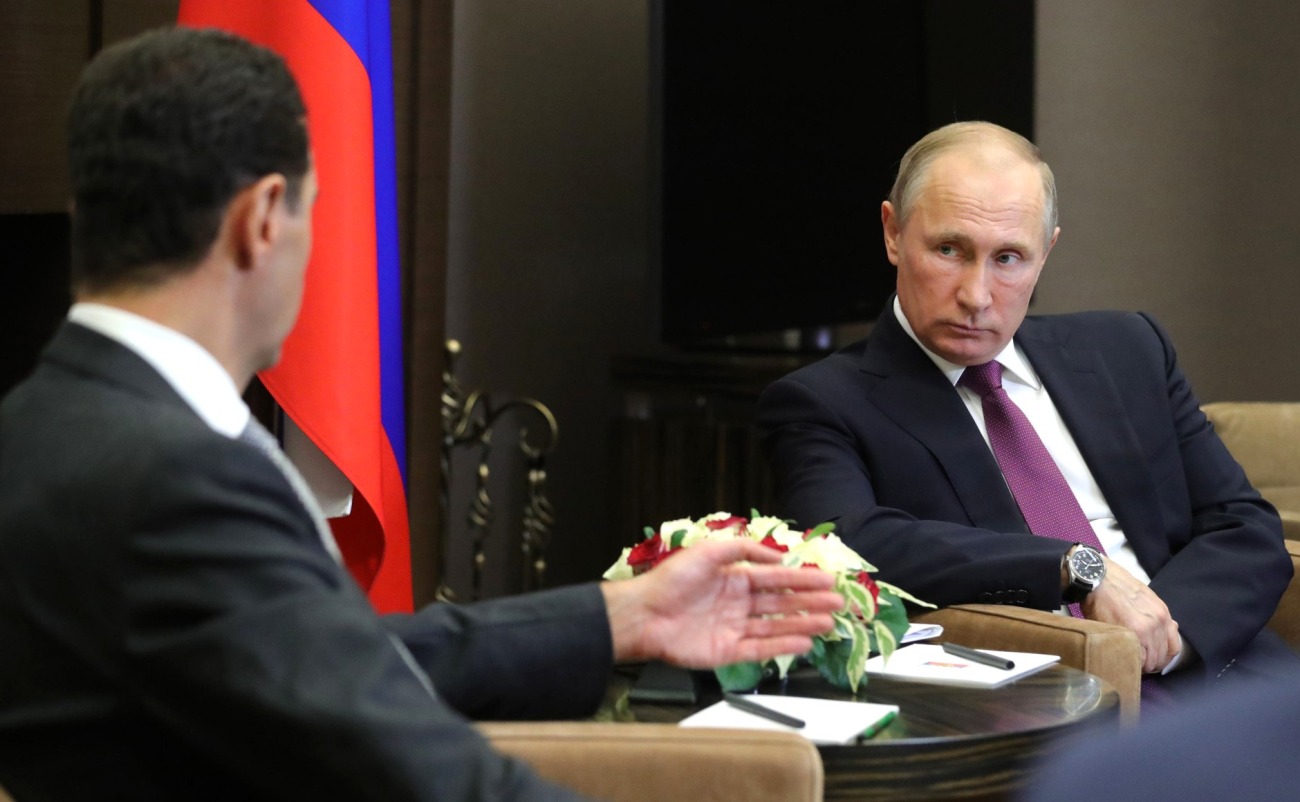China’s interests in Syria are driven by a combination of economic and security concerns. China’s involvement in Syria also presents an opportunity to balance the diminishing influence of Iran and Russia in the region, potentially enhancing Beijing’s geopolitical clout as the political landscape shifts.
Recent developments in Syria have marked a dramatic shift in the country’s political landscape.
Bashar al-Assad’s 24-year rule ended in December 2024 when Syrian rebel forces, led by Hayat Tahrir al-Sham (HTS), gained control of major cities, including Aleppo, Hama, Homs, and ultimately Damascus. As his regime crumbled, Assad was forced into exile, fleeing to Moscow for refuge.
For China, Assad’s fall represents more than just another Middle Eastern power shift. China’s diplomatic response was measured and cautious in response to these seismic shifts.
Through its UN representative, Fu Cong, China expressed readiness to work with the international community.
“China has long pursued a policy of friendship and cooperation with Syria. We stand ready to continue working with the international community for Syria to have a smooth transition and gradually embark on a path of peaceful development,” Fu Cong stated during a Security Council meeting on January 8.

The Chinese Foreign Ministry spokesperson, Mao Ning, called for a “political solution” to maintain stability in the region and emphasized the need for all parties to prioritize Syria’s long-term interests and work towards a lasting political settlement.
Syria-China Relations Under Assad
China had maintained strong ties with Assad’s government throughout the Syrian Civil War. This support was demonstrated through –
-
Consistent use of UN veto power (eight times) to protect Syria from international sanctions. Many analysts note the significance of this number, as Beijing has used its veto power only 16 times in its tenure as a permanent member of the UN Security Council. Remarkably, half of these vetoes have been aimed at supporting Assad’s regime.
-
Opposition to “color revolutions” and the Arab Spring movements.
-
Syria’s inclusion in the Belt and Road Initiative (BRI) in 2022.
-
Establishment of a strategic partnership in 2023, announced during Assad’s visit to China.
However, the fall of the Assad regime has marked a significant shift in Chinese interests in the region. Prior to these developments, China had positioned itself as a key international partner for Syria, with both economic and strategic investments in the country’s future.
The September 2023 Sino-Syrian strategic partnership agreement, which represented the second-highest level of diplomatic partnership in China’s foreign policy framework, marked a significant milestone in bilateral relations.
This marked a significant diplomatic boost for President Assad as his government sought to reassert itself on the global stage after years of isolation.
Now, with Assad’s sudden overthrow, China finds itself reassessing its regional strategy and investment priorities. While still adhering to the principle of non-interference in the domestic affairs of other countries, the loss of Assad as a diplomatic partner forces Beijing to navigate a new and uncertain political landscape in Syria.
China-Syria Relations
The relationship between China and Syria traces its roots back centuries, with the ancient Silk Road symbolizing the historical ties between the two civilizations.
Following the founding of the People’s Republic of China, Syria was among the first Arab nations to recognize and establish diplomatic relations with China, setting the stage for a longstanding partnership.
Currently, China’s interests in Syria are multifaceted, with its economic goals taking center stage. Moreover, Beijing is mindful of the security risks posed by Uyghur militant groups operating in Syria, as their activities could potentially stoke unrest in China’s Xinjiang region.
Beyond economic concerns, China’s role in Syria also plays a strategic part in regional stability. As Syria’s alliances shift, China has an opportunity to balance the growing influence of Iran and Russia in the region, further solidifying its position.
This involvement reinforces China’s regional influence and positions it to navigate and shape the evolving power dynamics in the Middle East.

China’s Economic Interests In Syria
Syria has long been a vital economic partner for China, especially as a prominent player in the Belt and Road Initiative (BRI).
Through the BRI, China sought to bolster infrastructure connectivity and cement its economic ties with the country. However, the sudden political upheaval following the fall of Assad has cast a shadow of uncertainty over these ambitions, leaving critical projects stalled and forcing China to reassess its strategy in the region.
China’s economic footprint in Syria remains significant, with major investments in oil exploration, infrastructure, and energy sectors. As a key player in these industries, China is committed to safeguarding its presence, viewing Syria as integral to its broader Middle East strategy.
Since 2019, China has been Syria’s leading economic partner. In 2022, bilateral trade between the two nations reached US$415.98 million, with Syria primarily exporting products like soap and essential oils, while China supplied machinery, electrical equipment, and fabrics. This trade relationship underscores China’s central role in Syria’s economic landscape, even as the political climate remains in flux.
Strategic Interest – China’s Middle East Policy
The collapse of Bashar al-Assad’s regime marks a pivotal shift in the Middle East’s geopolitical dynamics, unraveling power structures and alliances that had been central to the region’s stability.
This upheaval has further destabilized an already volatile environment, compounded by Israel’s incursions into Gaza, U.S. and U.K.-backed bombings in Yemen, Lebanon’s deepening instability, and the extrajudicial killings of Iranian military leaders.
For China, these developments present a significant challenge. The fall of Assad, a key regional ally, strains Beijing’s strategic interests, particularly amid rising tensions between Israel and its neighbors, ongoing oil crises, and the diminishing influence of Russia—a critical partner for China in the region.
This instability in Western Asia also threatens China’s broader political and economic engagements, including its African investments.
To safeguard its interests and contribute to regional stability, China must leverage its diplomatic ties with Arab states and play a more proactive role in brokering peace settlements. As one of several major players—including Russia, Türkiye, Iran, Israel, and the United States—China is positioned to influence the region’s trajectory.
China’s burgeoning partnerships with Gulf Arab states—underpinned by investments in energy, trade, and infrastructure—offer an avenue for active involvement in Syria’s post-Assad reconstruction.
Collaborating with Gulf nations, whose interests align with regional stability and rebuilding efforts, could open new markets for China while reinforcing its influence. In doing so, China could play a pivotal role in broader efforts to stabilize the Middle East, counterbalancing the diminishing clout of Iran and Russia and securing its strategic and economic foothold in the region.
Its ability to navigate these complexities will shape both its standing in the Middle East and its broader global strategy.
The Uyghur Militant Threat
However, economic interests aren’t Beijing’s only concern. China’s keen attention to developments in Syria is partly driven by the activities of the Turkistan Islamic Party (TIP), also known as the East Turkestan Islamic Movement (ETIM) – a Uyghur militant group with a long presence in the region.
The presence of these fighters complicates China’s diplomatic efforts with Syria’s new regime, as Beijing remains wary of the group’s potential to destabilize its Xinjiang region.
For over a decade, TIP has operated in Syria, aligning with Hayat Tahrir al-Sham (HTS), the Islamist faction leading the rebel forces that ultimately toppled Bashar al-Assad’s regime
On December 8, the day Assad’s government fell, TIP released a video in which its fighters vowed to extend their struggle to China, specifically targeting cities in Xinjiang, home to the Uyghur population.
A masked fighter declared in a video, “Here in Syria, we fight for Allah, and we will continue to do this in Urumchi, Aqsu, and Kashgar,” reaffirming the group’s aim to “liberate East Turkistan” from what they describe as “Chinese occupation.”
TIP’s presence in Syria dates back to the 1990s when its members fled the Chinese crackdown in Xinjiang. The group’s participation in the Syrian conflict gave it a foothold far from home but with ambitions rooted in opposing Beijing.
Adding to China’s concerns, reports in January revealed that the new Syrian leadership, under de facto ruler Ahmed al-Sharaa, appointed 50 military officials, including six foreign fighters linked to the banned East Turkestan Islamic Movement (ETIM), a group active in Xinjiang.
This development invited immediate opposition from Beijing, highlighting its fears of TIP and ETIM militants using Syria as a springboard to reignite unrest within China’s borders.
The situation underscores how Syria’s ongoing turmoil intersects with Beijing’s domestic security challenges, particularly in the volatile Xinjiang region.
A Cautious Future
Despite Syria joining China’s BRI in 2022, not a single Chinese-funded project has come to fruition, highlighting Beijing’s reluctance to invest in a region mired in instability.
Unlike Russia and Iran’s deep involvement in the Syrian conflict, China maintained a cautious distance, preferring diplomatic support over military intervention. While Syria’s government received political backing, the instability surrounding Assad’s fall has kept meaningful Chinese investment at bay.
For Beijing, political gestures toward Syria have not translated into economic commitments. While Assad’s government received diplomatic support and symbolic backing, it remains clear that Syria’s instability deters meaningful Chinese engagement. Political fanfare, it seems, is no substitute for tangible investment.
As China recalibrates its position in the Middle East, it faces the challenge of balancing its strategic and economic interests with the realities of a rapidly shifting geopolitical environment.
The evolving situation in Syria will be a critical test of China’s ability to navigate these complexities while safeguarding its broader global strategy.
- Shubhangi Palve is a defense and aerospace journalist. Before joining the EurAsian Times, she worked for ET Prime. She has over 15 years of extensive experience in the media industry, spanning print, electronic, and online domains.
- Contact the author at shubhapalve (at) gmail.com




